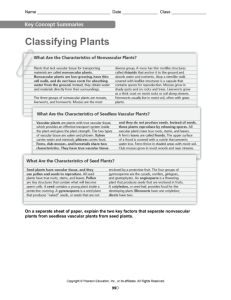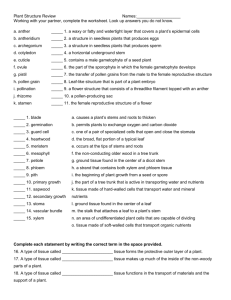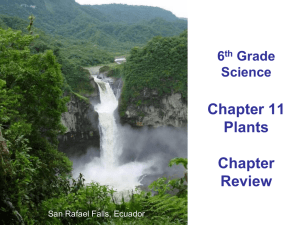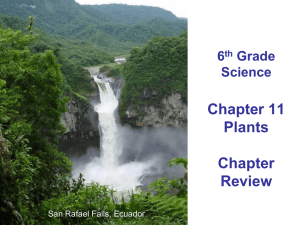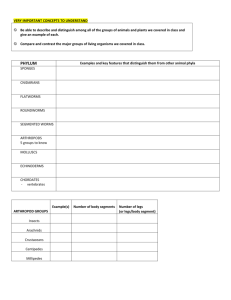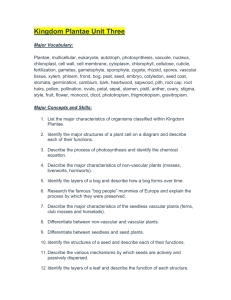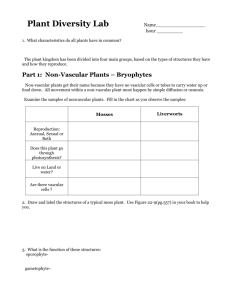Welcome to 6th Grade Science Class
advertisement
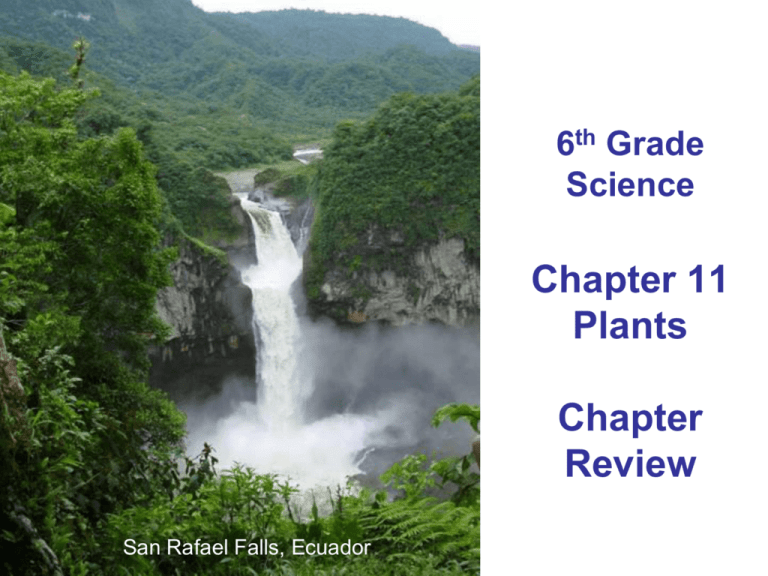
6th Grade Science Chapter 11 Plants Chapter Review San Rafael Falls, Ecuador Chapter 11 Review Questions 1. About how many varieties of plants have been discovered? a. 2,600 c. over 300,000 b. 35,000 d. 2,6000,000 Answer: Over 300,000 Chapter 11 Review Questions 2. What makes plants green? a. chlorophyll c. stomata b. photosynthesis d. carotenoids Answer: chlorophyll Chapter 11 Review Questions 3. Plants use chlorophyll to make sugar using a process called _________. a. chlorophyll c. stomata b. photosynthesis d. carotenoids Answer: photosynthesis Chapter 11 Review Questions 5. The _____ is a waxy protective layer on leaves? a. xylem c. cuticle b. phloem d. cambium Answer: cuticle Chapter 11 Review Questions 6. Which of the following is a seedless vascular plant? a. moss c. horsetail b. liverwort d. pine Answer: horsetail Chapter 11 Review Questions 7. Which of the following is a seedless nonvascular plant? a. moss c. horsetail b. liverwort d. pine Answer: moss Chapter 11 Review Questions 8. What are the small openings in the surface of a leaf surrounded by guard cells called? a. stomata c. rhizoids b. cuticles d. angiosperms Answer: stomata Chapter 11 Review Questions 9. What are the plant structures that anchor the plants called? a. stems c. leaves b. roots d. branches Answer: roots Chapter 11 Review Questions 10. What are the plant structures where photosynthesis takes place called? a. stems c. leaves b. roots d. branches Answer: leaves Chapter 11 Review Questions 11. What are the plant structures that support the branches and leaves? a. stems c. leaves b. roots d. branches Answer: stems Chapter 11 Review Questions 13. What are the plant structures that anchor moss called? a. stems c. rhizoids b. roots d. branches Answer: rhizoids Chapter 11 Review Questions 14. Mosses, liverworts, and hornworts are ______ plants. a. non-vascular, seedless b. non-vascular, seed c. vascular, seedless d. vascular, seed Answer: Non-vascular, seedless Chapter 11 Review Questions 15. Ferns, club mosses, and horsetails are ______ plants. a. non-vascular, seedless b. non-vascular, seed c. vascular, seedless d. vascular, seed Answer: vascular, seedless Chapter 11 Review Questions 17. What do plants use vascular tissue? a. transfer water - minerals c. food b. support the plant d. photosynthesis Answer: Transfer water - minerals Chapter 11 Review Questions 18. What are the first plants to grow in new or disturbed area? a. fronds c. pioneer species b. gymnosperms d. angiosperms Answer: Pioneer species Chapter 11 Review Questions 19. Fern leaves are called _____? a. fronds c. pioneer species b. gymnosperms d. angiosperms Answer: Fronds Chapter 11 Review Questions 20. Seedless produce ______ rather than seeds. a. photosynthesis c. peat b. spores d. nonvascular plant Answer: Spores Chapter 11 Review Questions 22. ______ plants grow taller and can live farther from water than _______ plants. a. Vascular, nonvascular c. Seedless, rhizoid b. Nonvascular, vascular d. Rhizoid, seedless Answer: Vascular, nonvascular Chapter 11 Review Questions 23. Seed plants generally are classified into two major groups - ______ and______. a. b. c. d. fruits, nuts fruits, vegetables plants, weeds gymnosperms, angiosperms Answer: gymnosperms, angiosperms Chapter 11 Review Questions 24. A herbaceous stem is ______. a. soft and green c. short and dry b. brown and woody d. thorny and green Answer: Soft and green Chapter 11 Review Questions 25. Each stomata is surrounded by two_____ cells. a. Chloroplast c. epidermis b. guard d. spongy Answer: guard Chapter 11 Review Questions 26. ______ allow carbon dioxide, water, and oxygen to enter and exit a leaf. a. cuticle c. rhizoids b. chloroplast d. stomata Answer: stomata Chapter 11 Review Questions 27. ____ is often the largest part of a plant. a. roots c. branches b. stem d. leaves Answer: roots Chapter 11 Review Questions 28. ______ transports the water in the vascular system of a seed plant. a. cambium c. xylem b. phloem d. leaves Answer: xylem Chapter 11 Review Questions 29. ______ transports the sugar (food) in the vascular system of a seed plant. a. cambium c. xylem b. phloem d. leaves Answer: phloem Chapter 11 Review Questions 30. ______ produces most of the new phloem and xylem in the vascular system of a seed plant. a. cambium c. xylem b. phloem d. leaves Answer: cambium Chapter 11 Review Questions 31. _____ are vascular plants that produce seeds that are not protected by fruit. a. angiosperms c. nonvascular b. gymnosperms d. seedless Answer: gymnosperms Chapter 11 Review Questions 32. _____ are vascular plants that produce seeds that are protected by fruit. a. angiosperms c. nonvascular b. gymnosperms d. seedless Answer: Angiosperms Chapter 11 Review Questions 33. Conifers, cycads, and ginkgoes are classified as _______. a. angiosperms c. nonvascular b. gymnosperms d. seedless Answer: gymnosperms Chapter 11 Review Questions 34. Apple trees, maple trees, and oak trees are classified as _______. a. angiosperms c. nonvascular b. gymnosperms d. seedless Answer: Angiosperms Chapter 11 Review Questions 35. Angiosperms are divided into two groups _____ and _____ a. monocots, dicots c. fruits, nuts b. plants, weeds d. tall, short Answer: Monocots, dicots Chapter 11 Review Questions 36. Corn, rice, wheat, and barley come from _____ a. monocots c. nonvascular b. dicots d. seedless Answer: monocots Chapter 11 Review Questions 37. Peanuts, peas, apples, and oranges come from _____ a. monocots c. nonvascular b. dicots d. seedless Answer: dicots Chapter 11 Review Questions 38. Plants called biennials complete their life cycles in _____ years. a. one c. more than two years b. two d. less than one year Answer: two Chapter 11 Review Questions 39. Plants called annuals complete their life cycles in _____ year(s). a. one c. more than two years b. two d. less than one year Answer: one Chapter 11 Review Questions 40. Plants called perennials complete their life cycles in _____ years. a. one c. more than two years b. two d. less than one year Answer: More than two years
